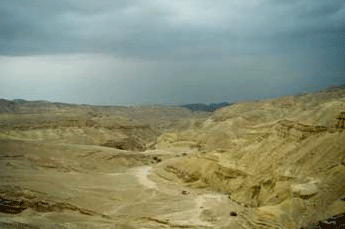
The Negev Photo: www.palestineremembered.com
|
|
 The Negev Photo: www.palestineremembered.com |
|
Umm Ghazi, Abu Kaff village, April 3 and 4:
|
|
Back in Lakiya I phone to Ghaliya and arrange to spend the night in her village, Abu Kaff, and record with her mother. Ever generous Hassan drives me over there. There's no other way I could have reached Abu Kaff since it's a long way off the main road, and its access 'road' is not surfaced. Hassan tells me that the authorities wouldn't make a gap for the connecting road in the fence of the autoroute until people demonstrated.
Abu Kaff village is even more spread out than Lakiya. In fact this tribe succeeded in holding on to some of their original tribal land. Hassan says this was because they had a strong sheikh who refused to move after 1948, unlike the Tarrabin and other tribes. But Abu Kaff doesn't have the status of a 'recognized' village so people are not permitted to build solid homes (though they can apply for permits). Ghaliya's mother's house is a one-floor breezeblock structure with a garden and a fence. Later I discover that it has no indoor toilet or bathroom. This keeps it safely out of the 'solid' category. Transgressing this borderline could lead to demolition. Ghaliya appears carrying her 6-months old baby daughter, with several sisters, a sister-in-law and many small children. Because everyone calls her 'Ghaliya' I hadn't realized she is married. For the whole time of my stay, no male appears. Umm Ghazi welcomes me, a dignified woman in an embroidered black dress. She is the daughter of the sheikh who originally stood out against Israeli eviction orders - and she looks it. She's nervous about recording, not from fear, but because of the unfamiliarity of 'speaking' in this way, to a recording machine and with everyone listening. If not for Ghaliya's help we wouldn't have managed to communicate at all, especially because of the dialect problem - Umm Ghazi doesn't understand my Arabic and I don't understand hers. The language spoken by the younger women is much closer to 'ummiyya' (educated spoken Arabic). What I do understand of Umm Ghazi's |
speech is her emphasis on the productivity of bedouin women. She herself looked after cows and sheep, and marketed their products, making it possible for her to educate her children, including Ghaliya. She says that about 15 years ago the authorities installed a system of taxes and permits that made sheep rearing unprofitable. She quickly sold her sheep, and turned to a new activity.
Umm Ghazi al-Kaff begins speaking: After recording ends, there's an interesting discussion between Ghaliya and a sister-in-law about the 'jami'at' (associations, NGOs), increasingly present in the Nagab in the last few years: are they good or bad? Ghaliya accuses them of being ineffective, and a source of manipulation and corruption. In a community systematically oppressed and impoverished for decade, it's not surprising if small statuses based in the chairmanship of local associations are bitterly competed for. Later they put me to sleep in what I fear is the only bed in the only bedroom. How to refuse? During fieldwork in camps I've often shared a bedroom, but being a guest here is different, I can't protest. |
|
[Women of the Tarrabin] [Umm Taleb and Umm Hatem] Copyright©2005 |
|
|